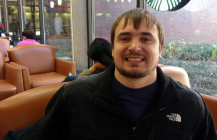
Photo by Shannon Carney
A change of major brought Matthew Hunt, a 30-year-old junior majoring in social work and minoring in history, to UMBC. Originally a business major at College Park, Hunt realized that the corporate world wasn’t for him and that he had a passion for social work. The major wasn’t available at his old school, which made UMBC a good option.
Hunt moved to Maryland from Washington, D.C. with his family due to the crime in the city. He began college right after high school, but due to some personal struggles and a busy work schedule, he had to take a break. Deciding that he wanted a degree to give him more options for his future, Hunt returned to college as an adult learner – a student over the age of 25.
Finishing out his first semester here, Hunt has felt UMBC’s warm welcome.
“I’ve met a lot of cool people and really interact well with a lot of my classmates,” Hunt said. “I think it helps that I look younger so some of my classmates think I’m their age. Maybe I’m just young at heart.”
And he does have a young face, looking to be in his early 20s. Though he looks like he might still be living with his parents, Hunt faces many challenges that are common among adult learners. He rents his own apartment and takes several classes as well as working a full-time job.
Hunt currently works for Jubilee Association of Maryland, an organization that supports developmentally disabled adults. He hopes to become a social worker to further support that community.
“My cousin’s son has Down syndrome and I met him and loved him and decided that’s what I want to do,” Hunt said.
Echoing the concerns of others, Hunt worries about how the election results will affect the social programs on which developmentally disabled adults depend.
“I’ve been very nervous. Especially with Medicare and Medicaid [President-Elect Trump] might cut. That could affect a lot of our clients,” Hunt said, his voice dropping. “It’s really up in the air with what’s going to happen, and that’s scary.”
He hopes that one day he can work to help change policy on a more direct level.
“My dream is to maybe one day be a lobbyist for [people with] developmental disabilities because I see how much the money helps. The funding can help them,” Hunt said.
For now, Hunt is working hard to complete school and fulfill his goals of obtaining his bachelors and then his masters. He feels positive about his choice of school.
“Coming to UMBC feels like a fresh start,” Hunt said.
The post Earning a degree to support the disabled appeared first on The Retriever.





